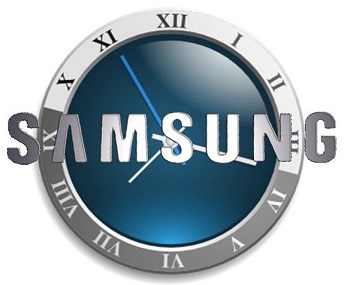The electronics company is reportedly developing a circular watch to compete with upcoming LG and Motorola devices.
According to a report that was released earlier this week on Samsung’s blog SamMobile, as part of its Gear line of wearables, the South Korean electronics manufacturer is developing a round faced smartwatch and, if this is true, it would mean that Motorola’s Moto 360 will no longer be the only high-tech circular watch on the market.
The new watch is rumored to be SIM enabled.
In addition to having a round display, Gear Solo, which is believed to be the name of the new watch, will supposedly feature SIM (subscriber identity module) functionality. Essentially, SIM is a circuit integrated into a mobile device that securely carries an identification number that is unique to the mobile user. It also stores personal data and prevents operation of the device when removed.
With the inclusion of this technology into the smartwatch, this would suggest that it would have more capabilities that are similar to a cellular phone compared to other smartwatches. For instance, it could have the ability to make phone calls without needing to be synced to a separate smartphone. In April, the company reportedly requested to have the term Gear Solo, which would feature SIM capabilities, trademarked.
Presently, it is not known if the third generation device from Samsung will be powered by Google’s Android Wear as is the case with the forthcoming Moto 360 device or the rumored upcoming LG smartwawtch, or if it will be powered by Tizen, Samsung’s operating system.
In addition to the Gear Solo smartwatch, other devices are expected to be unveiled by Samsung.
Aside from the highly anticipated wearable tech, it has also been speculated that the electronics company will be launching the Galaxy Note 4, as well as Gear VR, a virtual reality headset. It is suspected that Samsung will reveal its new circular smartwatch and other devices next week at its Unpacked media event, which will be held before the IFA trade show that takes place in Berlin and runs from September 5 to September 10.
Research released by Internet Retailer has shown that smartphone based shopping is rapidly gaining popularity.
It is no mystery that making sure that a store has an online presence – especially one in which products can be researched (or, even better, purchased) – is an important element in improving a retailer’s successes, but recent research is also showing that mobile commerce needs to play a bigger role in this effort, as consumers are looking to their smartphones and tablets on an increasing basis when it comes to finding the products and services that they want to buy.
A recent study involving the data from 366 American retailers has shown that m-commerce sales will be up 74 percent.
The study was conducted by Internet Retailer, which looked at U.S. retailers and their mobile commerce strategies. This was published in the 2015 Mobile 500. What it determined was that this year’s sales over smartphones and tablets would reach $59 billion, which is an increase of 74 percent over the $34 billion in sales that was achieved last year. Moreover, it also predicts that sales over smartphones and tablets will make up 23 percent of the online sales total for this year in the United States.
This shows that the pace of mobile commerce is growing faster than that of online shopping, overall.
 In the second quarter of this year, the online retail sales – including purchases made over desktop computers, laptops, and mobile devices – rose by 15.7 percent, said the Commerce Department. While this is certainly a solid rate of growth, it is also very clear that it is much lower than the increases being seen in m-commerce sales.
In the second quarter of this year, the online retail sales – including purchases made over desktop computers, laptops, and mobile devices – rose by 15.7 percent, said the Commerce Department. While this is certainly a solid rate of growth, it is also very clear that it is much lower than the increases being seen in m-commerce sales.
The two companies that achieved the highest mobile sales so far in 2014, with a combined $30.8 billion, are Amazon.com (in first place) and Apple (in second place). Those two companies, alone, hold a 47 percent share of the Mobile 500 smartphone and tablet based sales total.
That said, the report also acknowledged that mobile commerce as a market is nowhere near mature and there is still a great deal of room for growth among existing players as well as among new entrants.


 In the second quarter of this year, the online retail sales – including purchases made over desktop computers, laptops, and mobile devices – rose by 15.7 percent, said the Commerce Department. While this is certainly a solid rate of growth, it is also very clear that it is much lower than the increases being seen in
In the second quarter of this year, the online retail sales – including purchases made over desktop computers, laptops, and mobile devices – rose by 15.7 percent, said the Commerce Department. While this is certainly a solid rate of growth, it is also very clear that it is much lower than the increases being seen in 